Top 50 System Administrator Interview Questions
If you are preparing for a system administrator interview role, you can follow this guide, as we provide 50 must-ask questions ranging from entry-level to expert-level system administrator interview questions to guide you through the interview for a successful journey. These questions don’t just cover the technical aspects of system administration, such as managing servers, networks, virtualization, and security, but also assess your troubleshooting abilities, communication skills, and decision-making process under pressure.
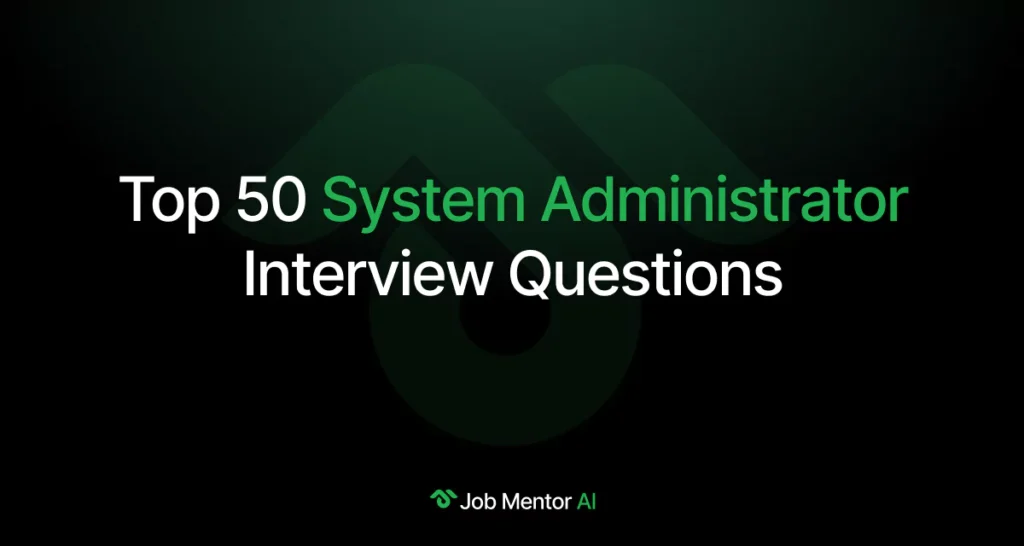
What Does a System Administrator Do?
A system administrator, or sysadmin, is an IT professional who ensures the computer systems in a company run smoothly and meet business needs. They manage servers and networks, troubleshoot issues, and keep systems running during failures. Preparing for a system administrator interview? This guide provides 50 key questions from beginner to expert level to help you succeed. Use the AI Interview Answer Generator to practice answers and build confidence.
Must-Ask System Administrator Interview Questions
This list of 50 interview questions is designed to help you prepare for a system administrator position efficiently, whether you are a beginner or a professional.
Introductory Phase System Administrator Interview Questions
1. Can you tell us about yourself?
2. Why did you choose a career in system administration?
3. What do you know about our company and IT infrastructure?
4. What’s your greatest strength as a system administrator?
5. How do you stay current with the latest technologies?
Background and Experience
1. Can you describe your past roles and responsibilities as a system administrator?
2. Have you worked in a team or independently as a sysadmin?
3. What was the biggest technical challenge you’ve faced?
4. Have you ever documented an IT process or created SOPs?
5. Describe a successful IT project you’ve led or participated in.
Technical/Tools Expertise System Administrator Interview Questions
1. What operating systems are you most comfortable working with?
2. How do you monitor server performance?
3. What scripting languages do you use?
4. What is your experience with wireframing or prototyping?
5. What backup solutions have you implemented?
Behavioral and Situational System Administrator Interview Questions
1. How do you handle high-pressure situations or system outages?
2. Have you ever disagreed with a supervisor about a technical solution?
3. How do you prioritize tasks when multiple systems need attention?
4. Describe a time you made a mistake. How did you handle it?
5. How do you handle non-technical users who need help?
Entry-Level System Administrator Interview Questions
1. Can you describe your experience with Windows and Linux operating systems?
2. What is DHCP, and why is it important?
3. Explain your experience with virtualization technologies such as VMware or Hyper-V?
4. How have you used your knowledge of operating systems to improve a network?
5. How do you ensure regular system backups and data recovery?
Mid-Level System Administrator Questions
1. How do you ensure system security and compliance?
2. How do you manage storage across servers?
3. How do you manage group policies in a domain environment?
4. How do you patch servers with minimal downtime?
5. How do you manage DNS in your network?
Expert Level System Administrator Questions
1. How do you design a scalable and fault-tolerant server infrastructure?
2. How do you manage hybrid environments involving on-premise and cloud infrastructure?
3. How do you manage group policies in a domain environment?
4. How do you secure a network against advanced persistent threats (APTs)?
5. How do you handle configuration management and deployment automation at scale?
Introductory Phase System Administrator Interview Questions
In this phase of the administrator interview questions, you will have to answer questions related to your background, your personality, as well as what motivates you to work as a system administrator.
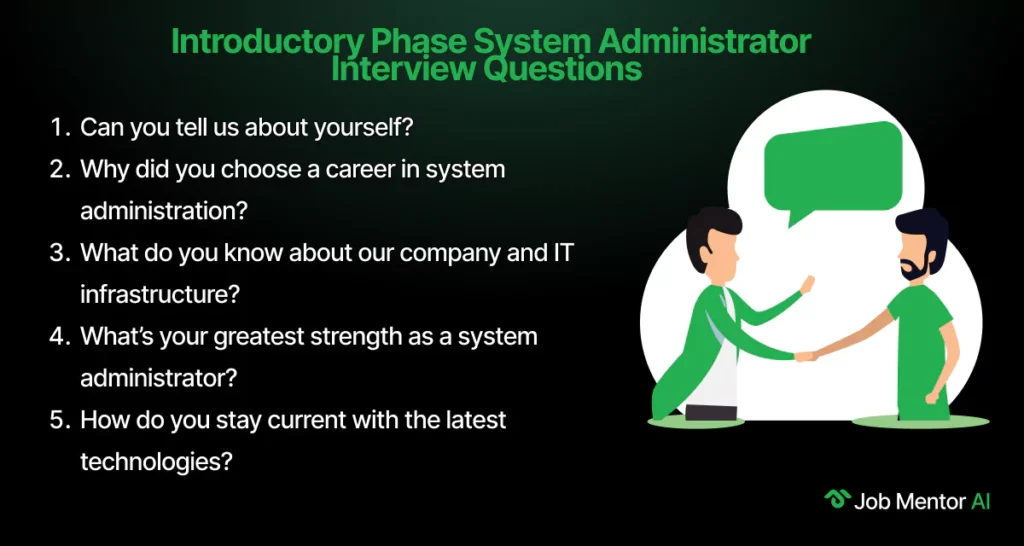
1. Can you tell us about yourself?
What Interviewers Want:
A concise summary of your background, interest in system administration, and any relevant skills and experience.
Strong Answer:
“I have a degree in IT, and recently got a certificate of completion for it, with over 3 years of experience managing servers and computer systems with Linux & Windows, which allowed me to specialize in system maintenance, troubleshooting, and improving system efficiency in both systems.”
Poor Answer:
“I have a degree in IT and have experience as tech support, and recently have been interested in working in this field.”
2. Why did you choose a career in system administration?
What Interviewers Want:
Wants to understand why you chose system administration as a career.
Strong Answer:
“I enjoy tasks that improve my problem-solving and being able to work behind the scenes, ensuring everything runs smoothly. As a system administrator, it allows me to combine both of my technical skills as well as my interest in maintaining a stable system.”
Poor Answer:
“I had an interest in working as a system administrator, and I heard it pays well.”
3. What do you know about our company and IT infrastructure?
What Interviewers Want:
Your research on the company and knowledge of existing systems.
Strong Answer:
“I researched [Company Name] and saw that you use hybrid systems for better distribution and prioritize cybersecurity, as safety should be a top priority when handling a huge amount of data. I also noticed your recent migration to Azure, which aligns with my experience.”
Poor Answer:
“I assume you use Azure for cloud computing, and ASW for data storage.”
4. What’s your greatest strength as a system administrator?
What Interviewers Want:
Self-awareness of job-related strengths and weaknesses.
Strong Answer:
“My greatest strength is being able to stay calm and analytical under pressure, which has allowed me to improve my skills by implementing it in a real-life scenario. I’ve resolved high-priority server issues without service interruption.”
Poor Answer:
“I don’t get bored easily, and have experience working with computers.”
5. How do you stay current with the latest technologies?
What Interviewers Want:
Your willingness to improve and adapt to new technologies.
Strong Answer:
“I regularly communicate with communities on Reddit(r/Sysadmin), Stack Overflow, Spiceworks, as well as friends working in a similar field. I also test new tools/systems in Docker and VM, as it allows me to simulate different systems and how the tools work in each environment.”
Poor Answer:
“I watch YouTube videos, use AI tools to keep me up to date with new technologies.”
Background and Experience System Administrator Interview Questions
In this phase of the system administrator interview questions, you will be asked to answer questions related to your technical experience, exposure, and how you applied your skills in real-life scenarios, whether through internships or self-projects.
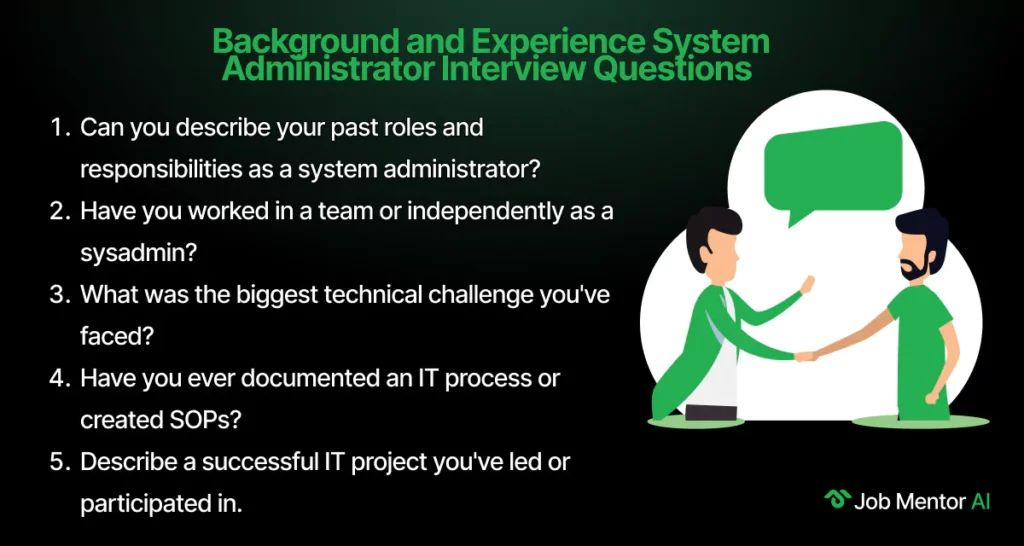
1. Can you describe your past roles and responsibilities as a system administrator?
What Interviewers Want:
Your scope of technical skills, experience, and responsibilities.
Strong Answer:
“I managed Linux Server environments, monitored system health, handled backups, and supported users. I also led a migration project from Zimbra to LibreOffice, which is native to Linux users, and there are open-source alternatives to Windows tools.”
Poor Answer:
“I worked on some Windows servers and helped fix the issue.”
2. Have you worked in a team or independently as a sysadmin?
What Interviewers Want:
Your ability to work with collaborators or take the initiative.
Strong Answer:
“In the past, I was part of a 3-person IT team responsible for supporting a company of around 100 users. With the team, I took full ownership of patch management, which involved scheduling and deploying updates for operating systems and third-party applications across both client machines and servers.”
Poor Answer:
“I usually prefer to work alone and typically avoid working in a group.”
3. What was the biggest technical challenge you've faced?
What Interviewers Want:
Your ability to think critically and problem-solving ability
Strong Answer:
One of the biggest technical challenges I faced was when our domain controller failed unexpectedly due to a corrupt Active Directory database. This happened during business hours, which meant that users couldn’t authenticate, access shared resources, or use email. I immediately initiated our incident response plan, isolated the issue, and started restoring from the most recent system state backup.
Poor Answer:
“I had to fix an issue regarding database issues, it took me hours.”
4. Have you ever documented an IT process or created SOPs?
What Interviewers Want:
Your ability to organize tasks smoothly and communicate ideas.
Strong Answer:
“In my last role, I created a comprehensive SOP for user onboarding and offboarding processes. This included detailed steps for account provisioning in Active Directory, assigning group memberships, configuring mailbox access, setting up MFA, and ensuring data backups for offboarded users.”
Poor Answer:
“I usually remember how to complete the given task without errors.”
5. Describe a successful IT project you've led or participated in.
What Interviewers Want:
Your experience in managing and contributing to projects.
Strong Answer:
“I led the migration of our on-premise Exchange Server to Microsoft 365. This project involved planning the migration timeline, auditing mailbox sizes, coordinating with department heads, and preparing user communication. I worked closely with Microsoft tools like the Exchange Hybrid Configuration Wizard and PowerShell scripts to ensure a seamless cutover.”
Poor Answer:
“I’ve helped by creating a beautiful front-end that is practical and aesthetic.”
Explore these helpful Interview Question Guides
Technical/Tools Expertise System Administrator Interview Questions
In this phase of the system administrator interview questions, you will be asked to answer questions related to your technical experience, including exposure to various tools and how you applied your skills in real-life scenarios, such as internships or self-projects.
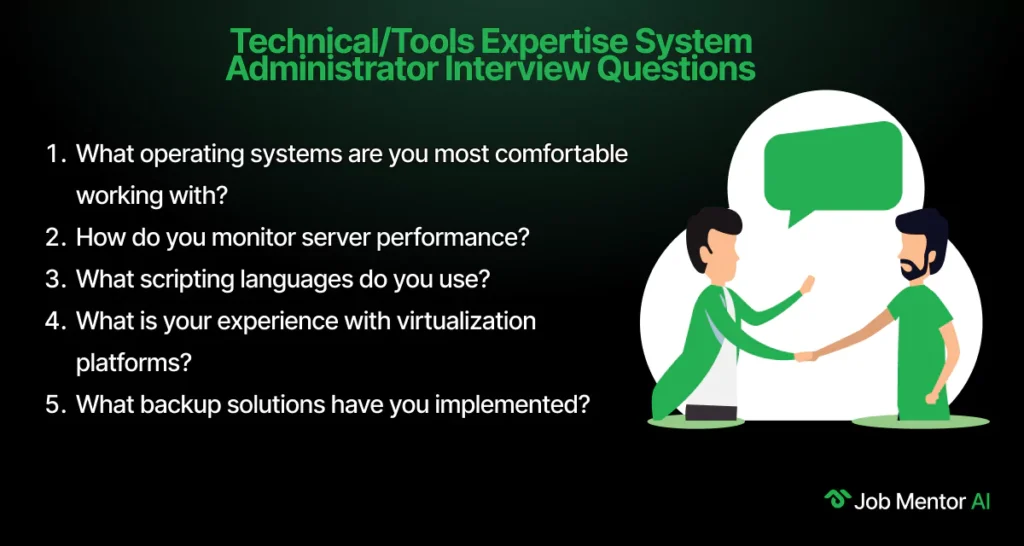
1.What operating systems are you most comfortable working with?
What Interviewers Want:
Your knowledge of the range and variety of operating systems.
Strong Answer:
“I’m highly proficient with Windows Server editions (2012 through 2022) and have substantial experience with Linux distributions such as Ubuntu, CentOS, and Debian. In my previous role, I managed Active Directory on Windows Server while simultaneously administering a LAMP stack on Ubuntu for our internal web tools.”
Poor Answer:
“I have used Windows for a long time, and used Linux only to be scared by it.”
2. How do you monitor server performance?
What Interviewers Want:
Your familiarity with tools and metrics.
Strong Answer:
“I use a combination of open-source and enterprise-level monitoring tools to ensure system performance and uptime. Tools like Nagios, Zabbix, and SolarWinds help me track key metrics such as CPU utilization, memory usage, disk I/O, and network throughput. I set up automated alerts for threshold breaches and use dashboards for trend analysis.”
Poor Answer:
“I log in and check the resource monitor and task manager.”
3. What scripting languages do you use?
What Interviewers Want:
How you optimize automation skills.
Strong Answer:
“I regularly use PowerShell for Windows environments and Bash for Linux. In one project, I created a PowerShell script that automated the onboarding process: it created AD user accounts, added them to groups, set up mailbox permissions, and sent a confirmation email to HR, all with a single command.”
Poor Answer:
“I use PowerShell for basic tasks.”
4. What is your experience with virtualization platforms?
What Interviewers Want:
Your understanding of virtual environments.
Strong Answer:
“I have managed environments using both VMware vSphere and Microsoft Hyper-V. I’ve created and maintained VMs, managed snapshots, set up failover clusters, and used vMotion to live migrate VMs during maintenance. I also configured virtual switches and VLANs to segment traffic efficiently.”
Poor Answer:
“I’ve used VM before, but learning about Docker scared me.”
5. What backup solutions have you implemented?
What Interviewers Want:
Your experience with data protection.
Strong Answer:
“In my last role, I implemented Veeam Backup & Replication for our VMware infrastructure, setting up incremental daily backups and weekly full backups with retention policies aligned to compliance requirements. I also configured Azure Backup for cloud-based workloads and rsync scripts for critical Linux directories.”
Poor Answer:
“I’ve used external drives to store sensitive files and Dropbox for cloud storage.”
Behavioral and Situational System Administrator Interview Questions
In this phase of the system administrator interview questions, you will have to answer questions related to real-world situations and respond to challenges as a system administrator. They evaluate problem-solving skills, teamwork, adaptability, and decision-making.
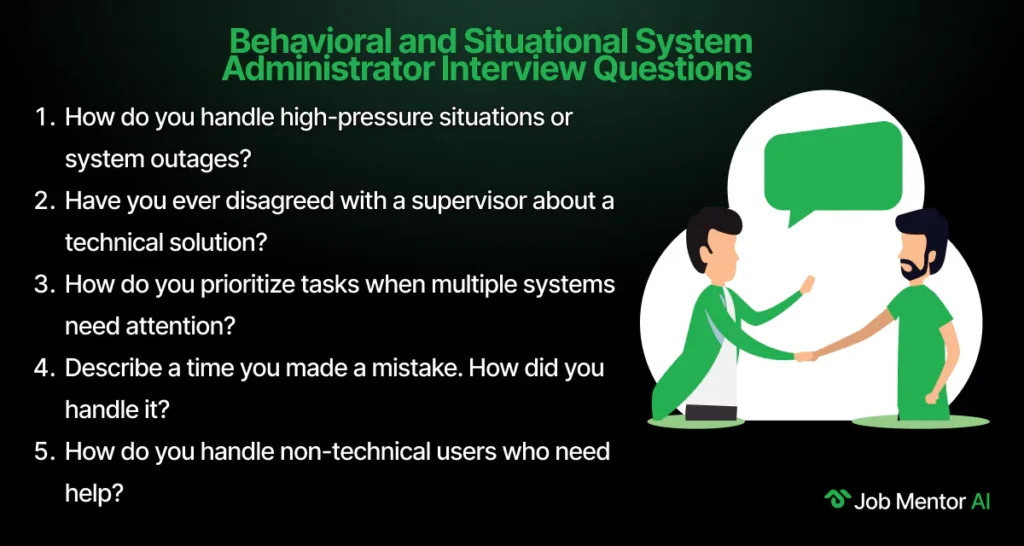
1. How do you handle high-pressure situations or system outages?
What Interviewers Want:
How you compose during high-pressure situations and process emergencies.
Strong Answer:
“When an outage occurs, my first priority is to stay calm and assess the situation systematically. I use monitoring tools and logs to identify root causes and follow our incident response protocols. In one instance, our DHCP server went offline, which brought several departments to a halt.”
Poor Answer:
“I panic but somehow get the work done successfully.”
2. Have you ever disagreed with a supervisor about a technical solution?
What Interviewers Want:
How you communicate constructive criticism with professionalism.
Strong Answer:
“Yes, during a security audit preparation, my manager suggested postponing updates to avoid interrupting daily operations. I respectfully disagreed, presenting evidence of vulnerabilities that could be exploited if we delayed. I proposed a phased rollout during off-hours and created a rollback plan to minimize risk.”
Poor Answer:
“I agree and move on, less stress on me.”
3. How do you prioritize tasks when multiple systems need attention?
What Interviewers Want:
How you stay organized and manage time.
Strong Answer:
“I assess each issue based on business impact, urgency, and SLA commitments. For example, if a file server is down, affecting all departments, it takes priority over a single-user email issue. I maintain a prioritized task list, communicate timelines to stakeholders, and update ticketing systems so everyone is informed.”
Poor Answer:
“I prioritize harder tasks first and move onto easy tasks.”
4. Describe a time you made a mistake. How did you handle it?
What Interviewers Want:
How you handle accountability and learn from it.
Strong Answer:
“I once mistakenly applied a GPO that disabled USB ports organization-wide instead of to a test group. I immediately recognized the issue, reverted the change, and forced a group policy refresh across the network. I informed the IT manager and affected departments right away, then updated our GPO change process to include mandatory peer reviews and sandbox testing.”
Poor Answer:
“When I make mistakes, I typically ask for help from colleagues.”
5. How do you handle non-technical users who need help?
What Interviewers Want:
Your patience and communication skills.
Strong Answer:
“I make it a point to be patient, empathetic, and clear. I avoid technical jargon and use analogies when necessary. For example, when a user couldn’t understand why they were denied access to a shared folder, I compared permissions to physical keys and locks, explaining how groups function like key rings.”
Poor Answer:
“I normally don’t make mistakes, and when I do, someone else is at fault.”
Entry-Level System Administrator Interview Questions
In this phase of the system administrator interview questions, you will have to answer entry-level questions that cover the basic concepts of a system administrator, Virtual Environment, and Network servers. This phase helps the interviewer understand your knowledge of the basics of a system administrator.
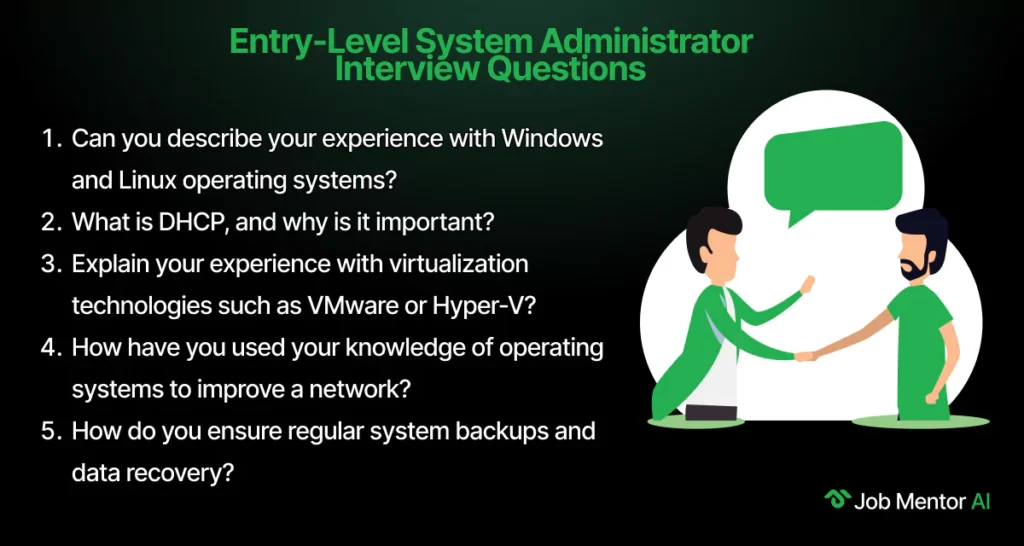
1. Can you describe your experience with Windows and Linux operating systems?
What Interviewers Want:
Your hands-on experience with different operating systems.
Strong Answer:
“I have extensive hands-on experience with both Windows and Linux operating systems in production environments. On the Windows side, I’ve worked with versions from Server 2012 to Server 2022, handling Active Directory, Group Policy management. On Linux servers, primarily Ubuntu and CentOS, for running web applications, setting up Apache and NGINX, and managing cron jobs, system logs, and firewalls using iptables and ufw.”
Poor Answer:
“I’ve used both Windows and Linux. I’m more comfortable with Windows, but I’ve used Linux before, but it was a bit too. I can Google things when needed.”
2. What is DHCP, and why is it important?
What Interviewers Want:
Your knowledge of DHCP and why it is important in the real world.
Strong Answer:
“DHCP stands for Dynamic Host Configuration Protocol. It’s a network management protocol that automatically assigns IP addresses and other network configuration parameters, such as subnet mask, default gateway, and DNS, to client devices on a network.”
Poor Answer:
“DHCP gives IP addresses automatically, so you don’t have to do it manually, and it’s easier that way.”
3. Explain your experience with virtualization technologies such as VMware or Hyper-V?
What Interviewers Want:
Your hands-on experience setting up and using VMware or HyperV.
Strong Answer:
“I’ve worked with both VMware vSphere and Microsoft Hyper-V in medium-sized enterprise environments. With VMware, I’ve provisioned and managed virtual machines using vCenter, configured resource pools, and set up templates for fast deployment. On the Hyper-V side, I’ve created and managed clustered VMs, configured shared storage, and set up virtual switches to segment traffic.”
Poor Answer:
“I’ve used VMware before. I created a VM once in VirtualBox and ran Ubuntu on it. I know the basics.”
4. How have you used your knowledge of operating systems to improve a network?
What Interviewers Want:
Your OS-level knowledge and how you improved network performance, reliability, security, or scalability.
Strong Answer:
“One of the ways I used my OS knowledge to improve a network was by identifying and resolving performance bottlenecks caused by improper DNS configuration on our Windows Server domain controllers. On the Linux side, I optimized our internal web server by adjusting kernel parameters for better socket handling, setting up a reverse proxy with NGINX, and implementing firewall rules using iptables to reduce unnecessary traffic.”
Poor Answer:
“I updated settings on the server once, and it made it faster. I’m not sure what exactly fixed it, but it worked.”
5. How do you ensure regular system backups and data recovery?
What Interviewers Want:
Your familiarity with backup strategies and backup tools.
Strong Answer:
“I ensure regular system backups and data recovery through a layered strategy. I use tools like Veeam Backup & Replication for virtual environments and rsync scripts for Linux file backups. I configure daily incremental and weekly full backups, with data stored both onsite and offsite via Azure Backup.”
Poor Answer:
“I back up files and save them to a hard drive. I haven’t recovered anything yet, but I think I’d be able to if it were needed.”
Mid-Level System Administrator Questions
In this phase of the system administrator interview questions, the focus is on your ability to manage and optimize systems, enforce policies, and support infrastructure at scale. These questions evaluate your ability to work independently on core IT services and processes in mid-sized to large environments.
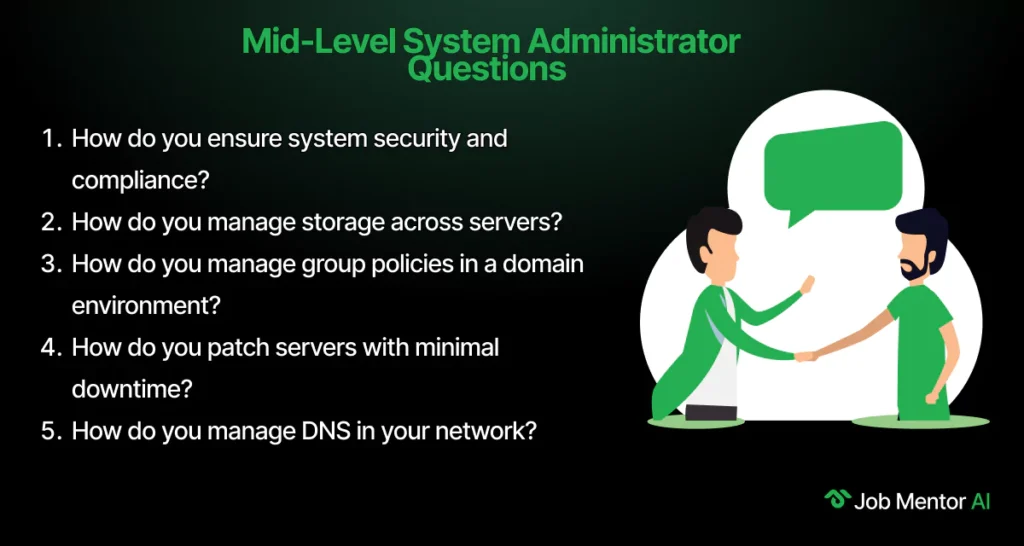
1. How do you ensure system security and compliance?
What Interviewers Want:
Your knowledge of multi-layered security strategy, awareness of compliance frameworks (e.g., HIPAA, ISO), and technical enforcement methods
Strong Answer:
“To ensure system security and compliance, I implement layered security measures including endpoint protection, firewalls, access control, and patch management. I enforce strong password policies, multi-factor authentication, and least privilege access. I regularly perform internal audits, use SIEM tools like Splunk for log analysis, and conduct vulnerability scans with Nessus.
Poor Answer:
“I install antivirus software and make sure everything is password protected. That usually works.”
2. How do you manage storage across servers?
What Interviewers Want:
Familiarity with storage technologies (RAID, SAN, NAS), capacity planning, and cleanup strategies.
Strong Answer:
“I manage storage using RAID configurations for redundancy, allocate space using LVM on Linux or dynamic volumes on Windows, and perform regular usage reviews. I monitor thresholds using tools like PRTG and clean up orphaned files or old backups. In a past project, I implemented quotas and storage tiering across departments to optimize space usage.”
Poor Answer:
“I just delete old files when the disk gets full.”
3. How do you manage group policies in a domain environment?
What Interviewers Want:
Your approach to GPO creation, testing, deployment, and troubleshooting.
Strong Answer:
“I manage GPOs by structuring them around departmental OUs and applying the principle of least privilege. I document every policy, test in a sandbox OU, and use security filtering and WMI filtering for precision targeting. I also use tools like GPResult and RSOP to troubleshoot application issues. Regular audits ensure policies are still relevant and effective.”
Poor Answer:
“I just create a new policy whenever someone asks for something. If it doesn’t work, I delete it.”
4. How do you patch servers with minimal downtime?
What Interviewers Want:
Your strategy for scheduling, testing, backing up, and applying updates without disrupting business.
Strong Answer:
“I patch servers during scheduled maintenance windows and test updates in a staging environment first. I use WSUS for centralized control of Windows updates and Ansible or shell scripts for Linux. I always take a snapshot or full backup before applying updates. For critical systems, I use failover clustering or live migration to avoid downtime. Post-patching.”
Poor Answer:
“I install updates whenever I remember, usually late at night, so nobody notices.”
5. How do you manage DNS in your network?
What Interviewers Want:
Understanding of DNS roles, record types, troubleshooting, and redundancy.
Strong Answer:
“I manage both forward and reverse DNS zones using Windows Server DNS. I routinely update A, CNAME, MX, and PTR records, and configure conditional forwarders for external resolution. I use tools like nslookup and dig for troubleshooting and monitor replication across DNS servers to ensure consistency.”
Poor Answer:
“I don’t usually touch DNS unless someone says a website won’t load.”
Expert Level System Administrator Questions
In this phase of the system administrator interview questions, the focus is on your ability to demonstrate leadership in infrastructure architecture, disaster recovery, automation at scale, cloud integration, and strategic security planning. These questions assess your ability to design resilient systems, optimize performance under pressure, and guide junior team members.
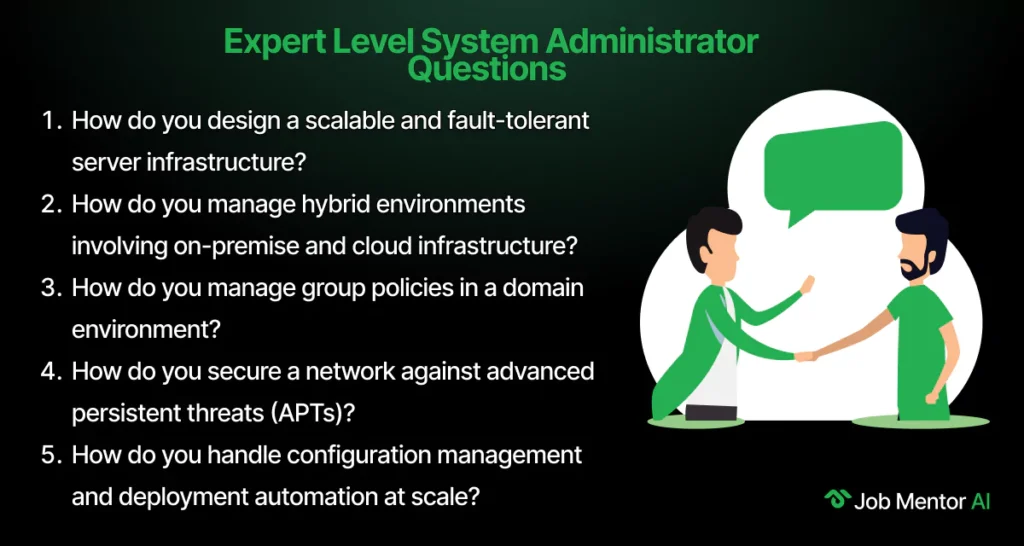
1. How do you ensure system security and compliance?
What Interviewers Want:
Your understanding of load balancing, clustering, redundancy, and monitoring tools to build scalable systems that prevent downtime.
Strong Answer:
“When designing scalable infrastructure, I start by separating services across multiple tiers: frontend, backend, and storage. I use load balancers like HAProxy or AWS ELB to distribute traffic across clustered servers. For fault tolerance, I configure active-active clustering and failover between data centers. Storage uses RAID 10 and is replicated across regions.”
Poor Answer:
“I add more RAM or servers when things slow down. That normally solves the problem.”
2. How do you manage hybrid environments involving on-premise and cloud infrastructure?
What Interviewers Want:
Your experience integrating cloud (Azure, AWS, GCP) with local servers, syncing directories, and managing workloads across both.
Strong Answer:
“In a recent role, I managed a hybrid environment with on-prem servers and cloud resources in Azure. I configured Azure AD Connect to sync identities, enabling users to access Office 365 and internal apps with the same credentials. We migrated file servers to Azure Files and used Site-to-Site VPNs for secure communication.”
Poor Answer:
“I’ve used the cloud before and installed AWS. I haven’t done much with on-prem and cloud together.”
3. How do you plan and execute a disaster recovery strategy?
What Interviewers Want:
Your recovery plan, including RTO/RPO, backup testing, DR sites, and documentation.
Strong Answer:
“I start by defining Recovery Time Objectives (RTO) and Recovery Point Objectives (RPO) based on business requirements. We use geo-redundant backups with automated daily snapshots to cloud storage. I also maintain a warm DR site with critical applications pre-configured and sync databases in real-time using replication.”
Poor Answer:
“I back up data regularly, but I’ve never actually had to use disaster recovery. It should work, though.”
4. How do you secure a network against advanced persistent threats (APTs)?
What Interviewers Want:
Your deep understanding of layered defense, threat detection, behavioral monitoring, and incident response.
Strong Answer:
“To secure against APTs, I implement network segmentation, zero-trust architecture, and least-privilege access control. I use EDR solutions like CrowdStrike for endpoint threat detection and SIEM tools like Splunk to monitor anomalies. Traffic is inspected with NGFWs and suspicious behavior triggers automatic isolation.”
Poor Answer:
“We just use antivirus and firewalls. If something looks off, we reset the system.”
5. How do you handle configuration management and deployment automation at scale?
What Interviewers Want:
Your experience with tools like Ansible, Puppet, or Terraform for automating server configs and deployments.
Strong Answer:
“I use Ansible for server configuration and Terraform for infrastructure provisioning. All configuration is version-controlled in Git, and deployments are triggered via CI/CD pipelines using Jenkins. We define roles and templates to ensure consistency across 100+ servers. Secrets are managed securely using HashiCorp Vault.”
Poor Answer:
“I usually SSH into each server and update them manually. It takes a while, but it gets done.”
Skills a System Administrator Should Have
Skills that a system administrator should have are as follows:
- Operating System: Managing Linux, Windows, and Mac operating systems proficiently.
- Network Administrator: Configuring, monitoring, and troubleshooting network devices
- Security: Knowledge of network protection tools and features.
- Cloud Computing: Deployment of a server on the cloud through AWS or Azure.
- Technical Skill: Configure, update, troubleshoot, and optimise systems.
Tips to Prepare for a System Administrator Interview
Internal linking: AI Interview Answer generator, AI Interview Assistant, AI Cover Letter Generator
- Use Real-Life Examples: Must be ready to share real-life experiences.
- Practice Sample Questions: Read sample questions to prepare for the interview.
- Technical Skill: Review your technical skills for better understanding.
- Database Expertise: Understand databases to store and manage data.
- Practice Mock Interview: Use AI Mock Interview Practice for response and feedback.
- Understand Company: Understand the IT structure of the company.
- Craft Strong Applications: Support your application with tailored documents using the AI Cover Letter Generator.
Conclusion
If you are stepping into the role of a system administrator or preparing to lead complex IT infrastructures, being well-prepared for an interview is essential. The above guides you through entry-level to expert-level interview questions to help you sharpen your technical knowledge, reflect on your experience, and approach future interviews with confidence. You can take time to practice and revisit concepts you struggle with.
Use the AI Interview Assistant today to practice and boost your interview confidence!
Top 50 System Administrator Interview Questions
Table of Contents
Recommended Resources
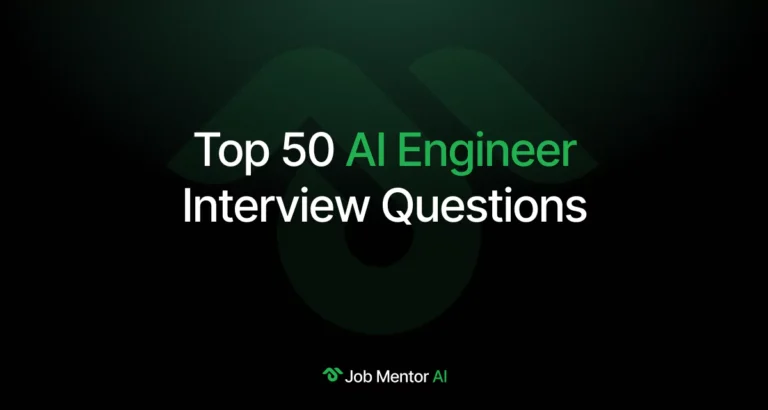
Top 50 AI Engineer Interview Questions
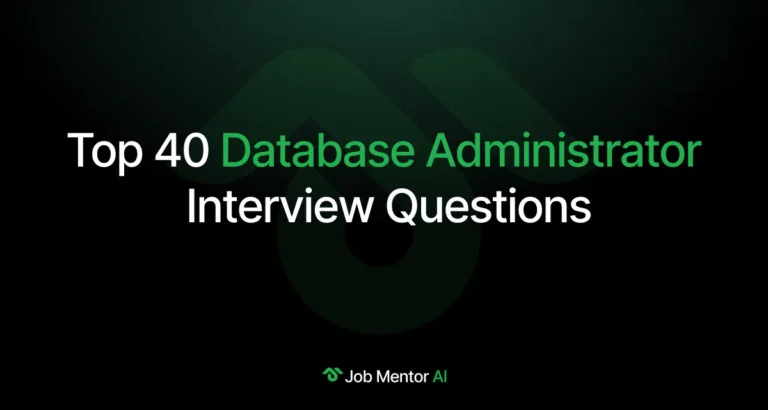
Top 40 Database Administrator Interview Questions
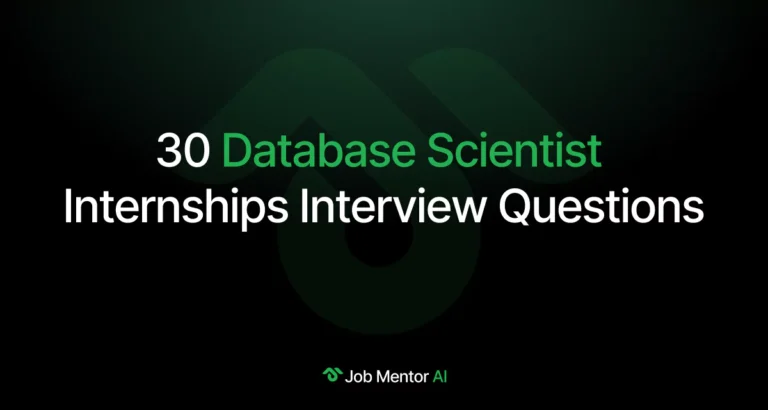
30 Data Scientist Internships Interview Questions and Answers
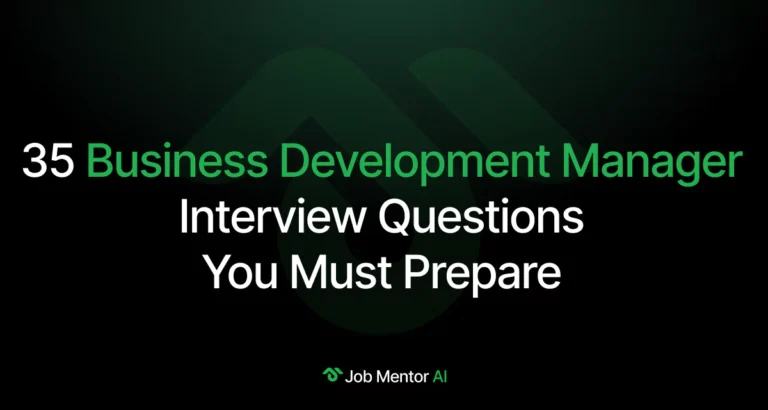
Business Development Manager

Junior SEO Specialist Interview Questions
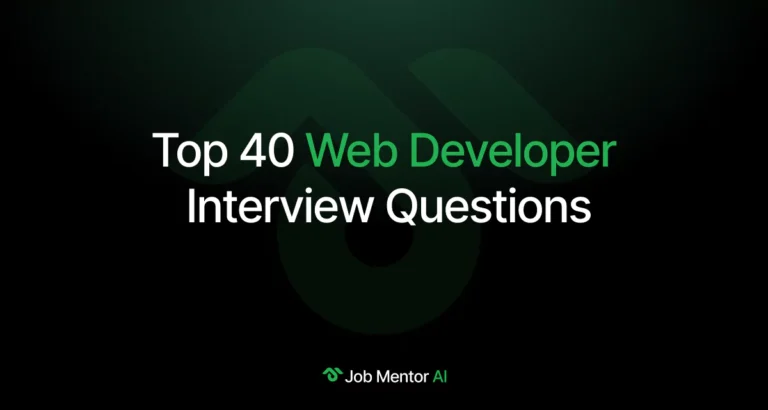
Web Developer Interview Questions
